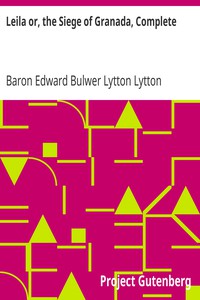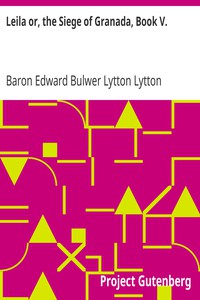Leila or, the Siege of Granada, Book II., Baron Edward Bulwer Lytton Lytton [reading diary txt] 📗

Book online «Leila or, the Siege of Granada, Book II., Baron Edward Bulwer Lytton Lytton [reading diary txt] 📗». Author Baron Edward Bulwer Lytton Lytton
"Priest," said he, in a more humble accent than he had yet assumed, "the tidings that thou didst communicate to me respecting the sole daughter of my house and love bewildered and confused me for the moment. Suffer me but for a single moment to recollect my senses, and I will answer without compulsion all thou mayst ask. Permit thy questions to be repeated."
The Dominican, whose cruelty to others seemed to himself sanctioned by his own insensibility to fear, and contempt for bodily pain, smiled with bitter scorn at the apparent vacillation and weakness of the prisoner: but, as he delighted not in torture merely for torture's sake, he motioned to the guards to release the Israelite; and replied in a voice unnaturally mild and kindly, considering the circumstances of the scene,
"Prisoner, could we save thee from pain, even by the anguish of our own flesh and sinews, Heaven is our judge that we would willingly undergo the torture which, with grief and sorrow, we ordained to thee. Pause—take breath—collect thyself. Three minutes shalt thou have to consider what course to adopt ere we repeat the question. But then beware how thou triflest with our indulgence."
"It suffices—I thank thee," said the Hebrew, with a touch of gratitude in his voice. As he spoke he bent his face within his bosom, which he covered, as in profound meditation, with the folds of his long robe. Scarcely half the brief time allowed him had expired, when he again lifted his countenance and, as he did so, flung back his garment. The Dominican uttered a loud cry; the guards started back in awe. A wonderful change had come over the intended victim; he seemed to stand amongst them literally—wrapt in fire; flames burst from his lip, and played with his long locks, as, catching the glowing hue, they curled over his shoulders like serpents of burning light: blood-red were his breast and limbs, his haughty crest, and his outstretched arm; and as for a single moment, he met the shuddering eyes of his judges, he seemed, indeed, to verify all the superstitions of the time—no longer the trembling captive but the mighty demon or the terrible magician.
The Dominican was the first to recover his self-possession. "Seize the enchanter!" he exclaimed; but no man stirred. Ere yet the exclamation had died on his lip, Almamen took from his breast a phial, and dashed it on the ground—it broke into a thousand shivers: a mist rose over the apartment—it spread, thickened, darkened, as a sudden night; the lamps could not pierce it. The luminous form of the Hebrew grew dull and dim, until it vanished in the shade. On every eye blindness seemed to fall. There was a dead silence, broken by a cry and a groan; and when, after some minutes, the darkness gradually dispersed, Almamen was gone. One, of the guards lay bathed in blood upon the ground; they raised him: he had attempted to seize the prisoner, and had been stricken with a mortal wound. He died as he faltered forth the explanation. In the confusion and dismay of the scene none noticed, till long afterwards, that the prisoner had paused long enough to strip the dying guard of his long mantle; a proof that he feared his more secret arts might not suffice to bear him safe through the camp, without the aid of worldly stratagem.
"The fiend hath been amongst us!" said the Dominican, solemnly falling on his knees,—"let us pray!"





Comments (0)